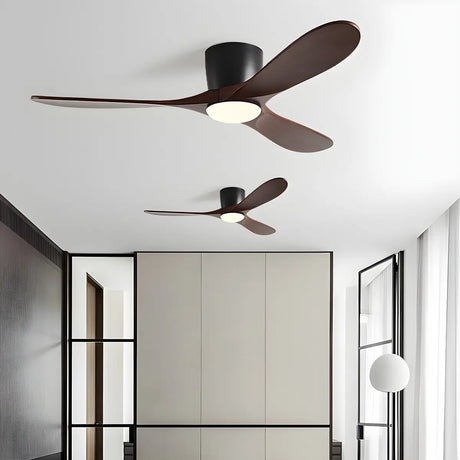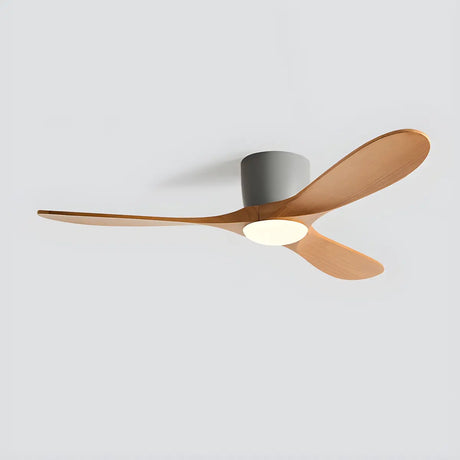Summer is coming, and it's time to use ceiling fans. Have you noticed your ceiling fan making noise lately? It’s not just annoying—it can also point to issues like loose screws, unbalanced blades, or even motor trouble. A noisy ceiling fan doesn’t have to ruin your peace. With a little attention and the right fixes, you can make it run quietly again.
What Types of Noises Do Ceiling Fans Make?

Ceiling fans can produce a variety of sounds, each pointing to a specific issue. Let’s break down the most common types of fan sounds and what they might mean.
Clicking/ticking sounds
Clicking noises are often caused by loose screws or parts. When the fan blades rotate, these loose components can move or vibrate, creating a repetitive clicking sound. Sometimes, the pull chain might hit the blades or the motor housing, adding to the noise. If you hear this, check for anything that might be out of place or unsecured.
Humming/buzzing
Dealing with a ceiling fan that's humming can be frustrating. This sound usually comes from electrical buzzing or humming in the motor. It might happen if the fan is running on a dimmer switch or if the motor is struggling due to wear and tear. Did you know that mains hum is linked to alternating current frequencies? It typically occurs at around 100 Hz or 120 Hz, depending on your local power supply. If the hum is persistent, it’s worth checking the motor or consulting an expert.
Grinding noises
A grinding sound is a clear sign of trouble. It often means the motor bearings are dry or worn out. Without proper lubrication, the fan’s internal components can rub against each other, causing this unpleasant noise. Ignoring it could lead to more serious damage.
Wobbling sounds
When your fan wobbles, it’s not just noisy—it’s also unsafe. This happens when the blades are unbalanced or warped. The uneven rotation creates a rhythmic sound as the fan struggles to maintain its balance. A balancing kit can help fix this issue.
Rattling
Rattling is another common noise in a noisy ceiling fan. It might come from loose screws, a shaky mounting bracket, or even debris caught inside the motor housing. Regular cleaning and tightening can usually resolve this problem.
Understanding these types of ceiling fan noise can help you pinpoint the issue and take the right steps to fix it.
Why Does My Ceiling Fan Make Noise?

Is your ceiling fan noisy? It might have common problems. Let’s look at what causes these sounds and how to fix them.
Loose screws and hardware
Loose screws often make ceiling fans noisy. The fan’s movement can loosen screws in the blades, motor, or bracket. This can cause clicking or rattling sounds. If blade holders are loose, you might hear rubbing noises. Check and tighten screws regularly to avoid these problems.
Unbalanced or warped fan blades
Unbalanced blades can make the fan wobble and create noise. When blades aren’t even, the fan vibrates and strains the motor. Balancing the blades is important for quiet and smooth operation. A balancing kit can help fix this and improve the fan’s performance.
Motor issues and dry bearings
A motor with dry bearings can grind or hum. This happens when the motor isn’t oiled properly. Electrical buzzing may also occur if the motor is faulty. Lubricate the bearings or call an expert if you hear these sounds.
Dust and debris buildup
Dust on the blades or motor can cause friction and noise. It can also make the fan wobble, leading to squeaks or rattles. Clean your fan yearly to prevent this. If your home is dusty, clean it more often to keep the fan quiet.
Improper installation or mounting
A poorly installed fan can vibrate and make noise. If the mounting bracket isn’t tight or straight, the fan may rattle or wobble. Fixing the installation can stop these issues.
Wiring problems
Bad wiring can make your fan noisy. Loose or damaged wires can cause flickering lights or strange sounds. Check the wiring and secure loose connections to fix this.
Knowing why your fan is noisy helps you solve the problem. Fixing loose screws, unbalanced blades, or wiring early can save you trouble later.
How do I Stop my Ceiling Fan from Making Noise?

1. Tighten screws and hardware
Loose screws are one of the most common reasons for a noisy ceiling fan. You’ll want to grab a screwdriver and check every screw on the fan, including those on the blades, motor housing, and mounting bracket. Tighten anything that feels loose. Don’t forget to inspect the pull chain and light fixtures if your fan has them. A quick tightening session can often fix a ceiling fan that’s making clicking or rattling sounds.
2. Balance fan blades with a balancing kit
If your fan wobbles or makes crackling or sizzling noises, the blades might be unbalanced. Uneven blades can cause the fan to vibrate, which leads to noise and even motor strain. A balancing kit is an easy solution. These kits usually include weights and clips to help you adjust the blades. Follow the instructions, and you’ll have a smooth, quiet fan in no time.
3. Lubricate motor bearings
Dry motor bearings can cause grinding or crackling noises. To fix this, apply a few drops of lubricating oil to the motor bearings. In one case study, a noisy electric fan motor was restored to quiet operation after proper lubrication reduced metal-to-metal contact. This simple step can make a big difference in how your fan sounds and performs.
4. Clean blades and motor housing
Dust buildup on the blades or inside the motor housing can lead to wobbling and annoying sounds. Regular cleaning prevents these issues. Use a damp cloth to wipe down the blades and a vacuum to remove dust from the motor housing. Cleaning at least once a year—or more often if your home is dusty—keeps your fan running smoothly and quietly.
5. Reinstall or remount the fan securely
If your fan was installed improperly, it might rattle or make crackling or sizzling sounds. Check the mounting bracket to ensure it’s secure and level. If it’s loose, tighten it or reinstall the fan. A properly mounted fan not only reduces noise but also ensures safe operation.
By following these steps, you can fix rubbing noise, wobbling, and other common ceiling fan issues. A little maintenance goes a long way in keeping your fan quiet and efficient.
Preventative Maintenance for Quiet Ceiling Fans
Keeping your fan quiet is easy with regular care. Simple maintenance can stop noises and help your fan last longer. Here’s how to keep it in good shape.
Regular Cleaning
Dust Blades Monthly
Dust on blades can make the fan wobble and noisy. Clean the blades every month to avoid this.
- Monthly cleaning is helpful in dusty homes.
- Use a microfiber cloth or long-handle duster for best results.
Clean Motor Housing Seasonly
Check the motor housing once a season. Wipe it with a damp cloth to remove dirt. This keeps the fan working well.
- Monthly cleaning stops dust from causing noise or friction.
Check for Loose Parts
Look at Screws Monthly
Loose screws often make fans noisy. Check all screws on the blades, motor, and bracket every month.
- A quick check can stop rattling or clicking sounds.
Tighten Screws When Needed
If screws are loose, tighten them right away. This small fix keeps your fan quiet and safe.
Lubricate Yearly
Oil the Bearings
Dry bearings can make grinding sounds. Add a few drops of oil to the motor bearings once a year. This helps the fan run smoothly.
Test the Fan After Oiling
After adding oil, turn on the fan to check for noise. If it’s still noisy, you might need a professional to look at it.
Conclusion
Noisy ceiling fans usually have loose parts or uneven blades. Motor problems can also cause sounds. The good news is these issues are simple to fix. Regular care, like tightening screws or fixing blade balance, helps a lot. Taking care of your fan keeps it quiet and working well. It also makes your fan last longer, giving you a calm home.
FAQ
Why does my ceiling fan make noise at some speeds?
Why does my ceiling fan make noise at some speeds?
Certain speeds can make vibrations or unbalanced blades worse. Look for loose screws or misaligned blades. Balancing the blades can quiet the fan at those speeds.
Can I use any oil to grease my ceiling fan?
Can I use any oil to grease my ceiling fan?
No, only use special non-detergent oil made for fans. Don't use regular oils like WD-40, as they might harm the motor or bearings over time.
How often should I clean my ceiling fan to stop noise?
How often should I clean my ceiling fan to stop noise?
Wipe the blades every week and clean the motor housing once a month. Cleaning often stops dust from causing wobbling or squeaky sounds.





